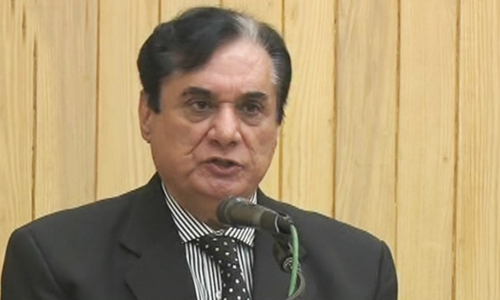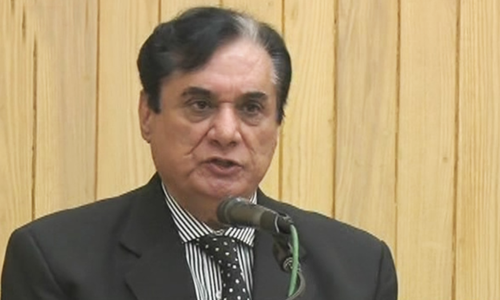Federal Information and Broadcasting Minister Fawad Chaudhry announced on Tuesday that the government would be introducing an ordinance for the appointment of the National Accountability Bureau's chairperson tomorrow (Wednesday), in an attempt to fill the "lacuna" in the law that made it mandatory to consult the leader of the opposition on the matter.
Chaudhry, who was addressing a press conference in Islamabad following a meeting of the federal cabinet, ruled out the possibility that PML-N President Shehbaz Sharif, the current leader of the opposition in the National Assembly, would be consulted on the appointment of the NAB chief.
"I still think that the opposition should change their leader so that we can hold talks on the matter," the minister said, adding that the government was firm on its stance that Shehbaz would not be consulted since he had been accused in NAB cases.
"We are clear that we will not consult him (Shehbaz) on the NAB chairperson's appointment and tomorrow, we will introduce an ordinance that will remove this lacuna [of the government being bound to consult the opposition leader]."
The minister said the ordinance would elaborate on how the anti-graft watchdog's head was to be appointed if the leader of the opposition was accused in corruption cases.
With the non-extendable four-year tenure of NAB Chairperson Javed Iqbal ending early next month, there has been speculation over whether he would be replaced or the government would promulgate an ordinance to extend his term.
Last week, Dawn had reported that the Ministry of Law and Justice was working on a proposal for the prime minister regarding the promulgation of an ordinance for giving extension to the sitting NAB chairperson.
The report had quoted a source privy to the development as saying that "in case the PM (prime minister) decides to grant an extension to the NAB chairman, the law ministry will draft an ordinance to amend the National Accountability Ordinance (NAO) and forward it to the president."
Under the NAB Ordinance, the prime minister has to consult the opposition leader for the appointment of the NAB chairperson.
The sources had told Dawn that the law ministry had examined the law and in case the prime minister decides to grant an extension to Justice Iqbal, an amendment will be made in sub-section b of section 6 of the NAO.
Sub-section b of the NAO’s section 6 states: “There shall be a Chairman NAB to be appointed by the President in consultation with the [Leader of the House and the Leader of the Opposition in the National Assembly] for a [non-extendable] period of [four] years on such terms and conditions as may be determined by the President and shall not be removed except on the grounds of removal of Judge of Supreme Court of Pakistan.”
'Selective campaign'
Chaudhry also criticised the media on Tuesday for what he termed a "selective campaign" over Pandora Papers leaks, which created a stir revealing details about offshores companies owned by businessmen, politicians, media moguls and other across the world, including more than 700 Pakistanis.
Released by the International Consortium of Investigative Journalists (ICIJ), the exposé revealed that key members of Prime Minister Imran Khan’s inner circle, including cabinet members, their families, political allies and major financial backers, have secretly owned an array of offshore companies and trusts holding millions of dollars of hidden wealth.
Commenting on the matter, Chaudhry said, "I see the photos of [Finance Minister] Shaukat Tarin and [Industries Minister] Khusro Bakhtiar, [both of whom have been named in the leaks], being aired on television channels [in connection with Pandora Papers], but no of media house owners, who have also been found to be owning offshore companies."
The minister said that the cases of the media house owners also needed to be highlighted and looked into as a "selective campaign" was unfair.
Sharing details about a cell set up by Prime Minister Imran Khan to investigate Pakistani individuals named in Pandora Papers, Chaudhry said it would categorise the named individuals into four groups: those who had declared their offshore companies in Pakistan, persons who had not declared their companies here and committed tax evasion, those who used their companies for money laundering and individuals who had not shown their offshore companies as part of the assets owned by them while declaring their wealth.
"Action will then be taken against people who will be found guilty of an unlawful act."














































